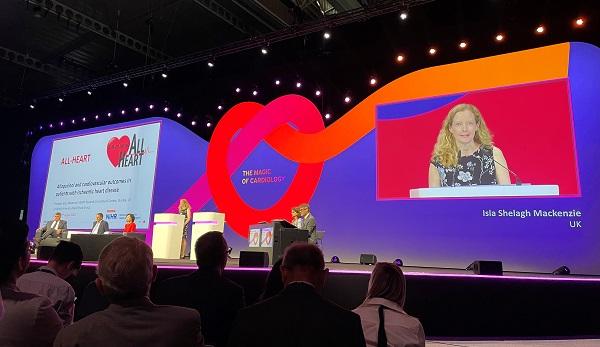ALL-HEART: Gout Drug Allopurinol No Help in CV Prevention
The long-running trial offers a welcome, definitive answer after smaller studies hinted at benefits for a range of CV outcomes.

BARCELONA, Spain—The gout drug allopurinol on top of usual care does not improve cardiovascular outcomes in patients over age 60 who do not have gout, the ALL-HEART trial confirms.
The long-running trial puts an end to hopes that a xanthine oxidase inhibitor that lowers serum uric acid levels and reduces oxidative stress might also prove helpful in the secondary prevention of cardiovascular disease.
While no safety issues were seen, “this study provides no evidence for the use of allopurinol therapy for prevention of CV outcomes in patients with ischemic heart disease,” said Isla S Mackenzie, MBChB, PhD (University of Dundee, Scotland), who presented the results in a Hot Line session at the European Society of Cardiology Congress 2022.
Mackenzie told TCTMD the trial design dates back to 2010 and 2011, prompted by earlier, smaller studies pointing to a beneficial effect of allopurinol on left ventricular function, left ventricular hypertrophy, and carotid intimal thickness, and even as a means of boosting exercise tolerance in angina patients. But it had never been tested in a large, randomized trial.
To that end, Mackenzie and colleagues randomized 5,721 patients (mean age 72 years; 75% male) to allopurinol or placebo and followed them for an average of 4.8 years. Nearly one in 10 allopurinol patients withdrew from follow-up (as compared with 2.6% of placebo-treated patients), and fully 57.4% of allopurinol patients stopped their study drug.
Ultimately, by the study’s conclusion, there were no differences in the primary outcome of nonfatal MI, nonfatal stroke, or CV death and no differences across a broad range of secondary endpoints. No subgroup emerged as more likely to benefit, or being more at risk of side effects, including incident cancers.. Health economic analyses are pending, but with no difference in key outcomes, “no effect is plausible,” she said.
That said, “ALL-HEART is the first and only large, randomized trial looking at the effect of allopurinol on major outcomes in patients with ischemic heart disease, and it provides robust evidence on the role of allopurinol in these patients. This is a question that's been unanswered for many years,” Mackenzie stressed. “Allopurinol remains an important medication when we're managing patients with gout, [but] other avenues for treatment of ischemic heart disease need to be explored in the future.”
Antioxidant Disappointment
The scheduled discussant for the trial, Leslie Cho, MD (Cleveland Clinic, OH), congratulated the investigators for getting the trial done, but noted that this is “yet another negative antioxidant trial” in CVD prevention. Part of the problem, she said, might be that the antioxidant capabilities of allopurinol make it a relatively minor player in this space, particularly when most patients were already taking guideline-directed medical therapies that have their own antioxidant effects.
These were also patients who, at a mean age of 72, “were late into their disease,” Cho said. “If you allow me to make a soccer analogy, this would be like being five down, going into overtime, and thinking you might win.”
While there is “clear and convincing evidence” that oxidative stress is involved in the pathogenesis of atherosclerosis, “study after study” of candidate antioxidants have been negative. What’s needed, Cho said, are more-precise markers for measuring baseline levels of oxidative stress, and more-targeted therapies that can work on its major triggers.
Shelley Wood was the Editor-in-Chief of TCTMD and the Editorial Director at the Cardiovascular Research Foundation (CRF) from October 2015…
Read Full BioSources
Mackenzie IS. Allopurinol and cardiovascular outcomes in patients with ischaemic heart disease. Presented at ESC 2022. August 27, 2022. Barcelona, Spain.
Disclosures
- MacKenzie reports consulting for AstraZeneca and Amgen outside the current work.
- ALL Heart was funded by the Institute for Health Research Health Technology Assessment Programme.





Comments